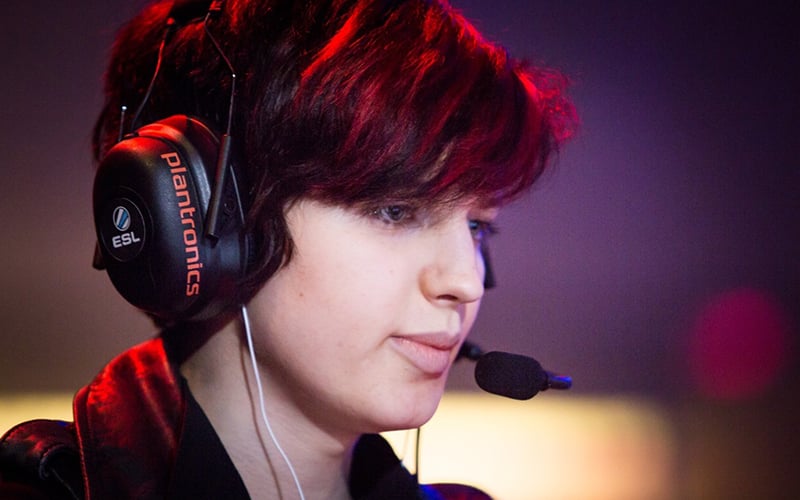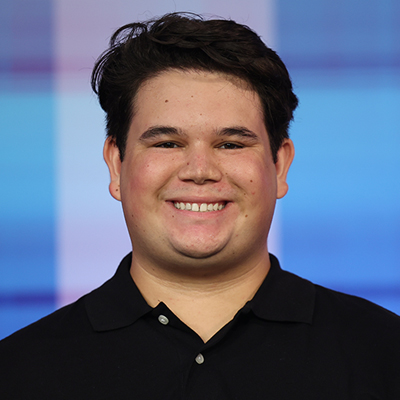
Sasha Hostyn, the first woman to win a major StarCraft II tournament, has said she has been a victim of transphobia. (Photo courtesy of Turtle Entertainment)
PHOENIX – The battle for inclusivity and safe spaces is a never-ending fight. In the gaming community, it’s no different and possibly even more challenging for a culture historically dominated by heterosexual males since its inception.
However, Queer Women of Esports is pushing back on the societal boundaries built around the gaming community by educating and motivating women and the LGBTQ community to create a safer and more inclusive community. Among its projects is a mentorship program that includes Marissa Rohr, Grand Canyon University’s Esports Supervisor.
“While I was looking more into women in gaming, I realized that sometimes when you talk about women in gaming, it can’t be inherently exclusive because there’s a lot of different people that identify very differently,” Rohr said. “There are nonbinary people, there are trans students, so like, ‘Where’s their space too?’”
In a study by OnlineRoulette.org that surveyed 788 LGBTQ members, over 88% said they have been harassed in their own gaming communities. Around 50% of those surveyed said they experience derogatory comments about their sexuality along with other verbal assault and various sexist comments. Sasha Hostyn, a highly regarded StarCraft II player who is openly transgender, has gone public about the transphobia she has seen in the gaming community.
Dr. Sarah Hays, the Director of Programming for Queer Women of Esports, said ignorant comments made towards women and marginalized genders not only have a harmful affect toward the people, but also to the workplace.
“When you have people who are tired and are constantly fighting for their role because they feel like they have to challenge one more microaggression because somebody just doesn’t understand why a (transgender) or nonbinary identity matters. And pronouns are important,” Hays said. “It means that people are getting pushed out, so having an open door means the industry is going to improve and grow.”
The nonprofit organization is starting at the roots to create change through the fourth iteration of its mentorship program, which helps connect a select group of individuals to high-ranking industry veterans in the Esports industry. Together, they work to solve problems within the gaming community through Capstone Projects. That work includes creating kickstarters, websites, social media platforms and even sponsored tournaments.
While the Capstone Projects starts as a passion project, there is some financial incentive. At the end of the mentorship cycle, the projects are presented to the QWE advisory board to judge the top three projects, which receive $5,000 each.
“We have six-month cycles where we offer 20 mentees connections to vetted industry veterans who work in various areas of the Esports industry from competitors to game designers, everything from coaches to legal representation in Esports, specifically, so we have a wide gamut of Esports representation, from collegiate all the way up to like corporate,” Hays said.
One of the mentees looking to make a change in the gaming community is Rohr. She used her mentorship cycle and the start of her new job to combine efforts of promoting inclusivity in collegiate Esports. Using her platform at GCU and the resources of her job, Rohr is able to immediately make an impact in the local GCU Esports community to create a more accepting space through gaming nights on Wednesday exclusively reserved for women.
“So we’ll close off the facility for just women to come in and have that space to play, have that space to game and create friends and game with different people,” Rohr said. “I’m also inviting guest speakers this year from the industry from all the connections that I made. So we can have like fireside chats about like what it’s like to work in the industry, what are some hardships, what are some tips about being more confident.”
She started her mentorship program inspired by figuring out what prevented women from joining gaming clubs. In her research, she found a bigger problem: not only women were kept out of gaming communities.
Making space for everyone in the gaming community is at the forefront of the fight for inclusivity. Gen.G senior marketing manager Alicen Lewis is one of the QWE mentors and prides herself on exposing her mentees to the industry and building lasting connections that will propel people forward in Esports.
“When I’m mentoring them, it’s usually twofold,” Lewis said. “I like to help give them knowledge about the industry. I like to help them understand things that are going on. It feels like a lot of the barrier to entry for students is just not understanding how to get into the industry or what goes on in the industry or the different roles that are available in the industry.”
One of Lewis’ mentees, Leanne Huang, investigated as to why women do not consider themselves as “gamers.”
“It’ll often say it’s a positive if you’re a gamer or you need to be a gamer to apply for this job and women are less likely to identify themselves as that just because like they’ve been told they aren’t that,” Lewis said. “Are they basically keep themselves out of these jobs? Why do other people perceive them as not good for these jobs?”
A diverse community will allow for everyone to be heard and for everyone to be represented. Even the unseen people are part of their community.
Lewis summed it up best.
“The more voices that you have, the more perspectives that you have, the better it is overall,” she said.
